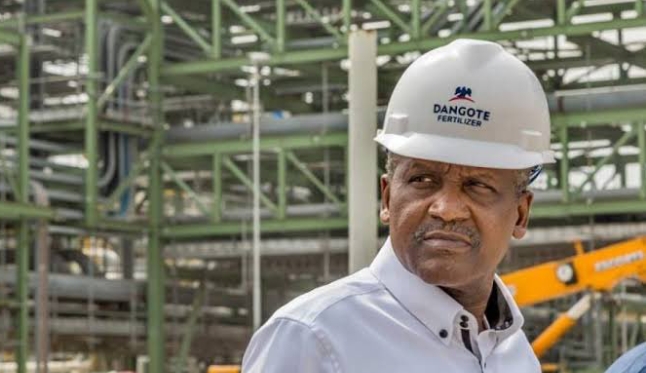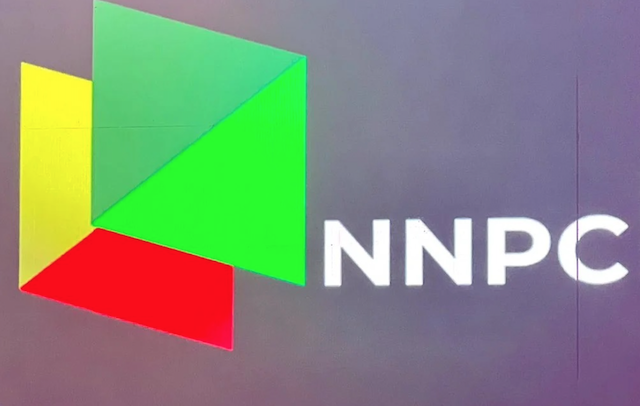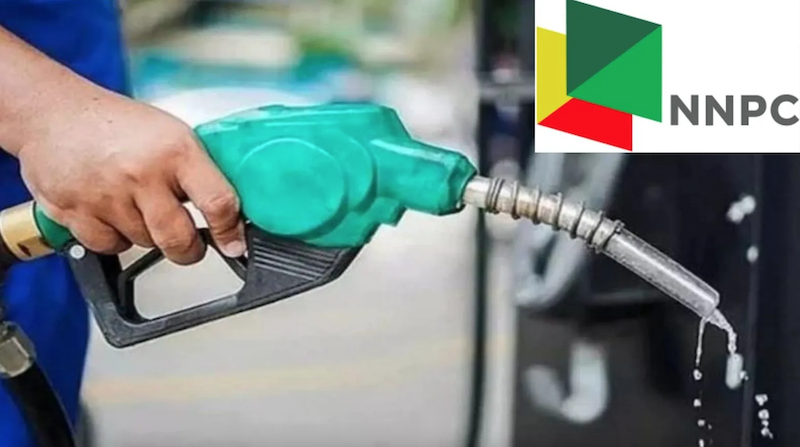The Nigerian National Petroleum Company Ltd. (NNPCL) has increased the price of petrol from N585 to between N855 and N890 per litre. Correspondents, who monitored the situation in Lagos metropolis, observed that in the midst of ongoing fuel shortages and crises, marketers swiftly updated their pump prices to reflect the new rates.
NNPCL stations in Ikoyi, Victoria Island, Gbagada, Ikeja, and Ikorodu Road have adjusted their prices to N855 per litre. Major oil marketers such as Northwest, Mobil, TotalEnergies, and NIPCO are selling petrol between N868 and N900 per litre. Some motorists expressed frustration over the sudden price hike.
Mr Godwin Emeka, a public transporter, said, “I am not happy about the price increase because those of us with limited means cannot afford it. I use the fuel for transportation, and a passenger from Orile to Oyinbo pays N100. I urge the government to address this sudden increase in petrol prices,” he said.
A passenger, Mr Ibrahim Muyideen, also said that the price hike would negatively impact passengers.
“We used to buy petrol at N619 per litre, and now it’s N868. The government should address this fuel scarcity and high prices, as everyone, regardless of their financial status, is suffering,” he said.
It was observed that many marketers did not wait for their stock to deplete before adjusting prices, as they did during previous price reductions. Some private stations have set their prices at N897 per litre, the increase is said to align with global prices and alleviate NNPCL’s debt burden.
This adjustment follows a recent disclosure by NNPCL that the company owes $6 billion to its suppliers. The Federal Government has denied claims that it directed NNPCL to set fuel prices at N1,000.
Nnemaka Okafor, Special Adviser on Media and Communication to the Minister of Petroleum Resources, Heineken Lokpobiri, clarified that the government was addressing false claims circulating on social media about inflated petroleum prices.
When contacted, Mr. Olufemi Soneye, Chief Corporate Communications Officer at NNPCL, declined to comment on the price increase but promised to provide updates when available.
Fuel pump price hike: Motorists express frustration
Many motorists in the Federal Capital Territory (FCT), have expressed frustration over increase in the pump price of petrol. NNPC Retail Management has approved upward review of the pump price of petrol from N617 per litre to N897 llitre, effective from Sept. 3. This is amid economic hardship and persistent fuel scarcity.
Checks revealed that the NNPC retail stations immediately adjusted their pumps and totems (price boards), reflecting the new PMS price of N897 as against N617 per lite. The independent marketers have also adjusted their pumps as they are now selling between N930 and N1,200.
Following the development, many commercial vehicles were off the roads as operators queued at the few filling stations selling the product. Many stations at Apo, Kubwa express way, airport road were not selling while long queues were seen at the few selling. Many commuters comprising civil servants were seen stranded at various bus stops, while motorists, who could afford to buy fuel from the black market increase transport fares.
The motorists, who spoke to NAN expressed sadness about the situation, while calling for the Federal Government’s intervention on the persistent fuel scarcity and hardship on citizens. Alhaji Abdulaziz Isah, a businessman said the removal of the fuel subsidy with no proper plans in place had affected the oil and gas sector as well as the nation’s economy.
“The dollars keep going high and it makes it difficult for the importers and marketers to buy petrol, this is because they need to sell as they buy to make their profit. If the government is not ready to make a lasting policy they should bring back the subsidy as a lot of citizens are suffering.” Isah said.
A civil servant, Mr Aloze Ojo, said he had been in the filling station since 7 a.m, and he was yet to get fuel.
“We know it is not the government’s making but it should work on the roadmap to avoid any further problem. The hardship is too much, at times, I cannot go to work because there is no money for transportation and feeding is a bigger problem.”
A taxi driver, Olusegun Ade said that things were so complicated presently, as they were battling with high cost of petrol and scarcity.
“I run at a loss now, this is because I buy at a high cost and if I increase the transportation, some passengers nay not be able to afford it. My family depends on my daily returns and it has not been easy meeting up and with the latest increase I do not know what to do.
“I am begging our president to do something fast on the suffering of Nigerians as it is not easy for a lot of us please,” Ade said.
Mrs Rita Uka, a retired civil servant also urged the government to hasten its Compressed Natural Gas (CNG) project across the country to boost utilisation of CNG vehicles to crash transport fares. She said that over dependence on PMS was literally making it a scarce product, adding that when CNG becomes common, with its affordability and infrastructure nationwide, PMS would not be scarce anymore.
A Bolt and Uber driver, Mrs Alice Uzo said that the harsh economic situation had increased occasioned by the lack of fuel as well as its high cost. She said that there was no more profit in the business as she had been driving at a loss just to sustain her means of livelihood.
“I think I will just go home and sleep because this will be very hard, where are we going to? The president needs to do something urgently.”
A correspondent, who monitored the City Centre and suburbs on Tuesday, observed that black marketers were making brisk business selling between N1, 500 and N2,000 per litre.
Fuel pump price increase will hike food prices again– commuters, traders
Some traders and commuters in the Federal Capital Territory (FCT) have frowned at the increase in the pump price of Premium Motor Spirit (PMS) by the NNPC Ltd. The commuters and traders, who spoke to NAN in Abuja on Tuesday, said the development would increase food prices which was gradually crashing and also the sufferings of the masses.
Mr Ignatius Ugwu, a civil servant, said the fuel pump price increase would further reduce the purchasing power of workers. He said the increase would hike transportation fares which would make it difficult for workers to resume work promptly and be productive. Ugwu appealed to the Federal Government to pay workers’ minimum wage and introduce other palliatives that would help cushion the effect of the increase on the masses.
”This information is very scary for a country like ours where people are struggling to eat even one good meal a day. This increase will make transport fare and other prices of goods and services to go up. The government should have been magnanimous enough to put some things in place before this increase. They should have paid minimum wage and other arrears, they should have brought out buses to help the masses because whether we like it or not, prices of things will go up, ” he said.
Mrs Antonia Ogbede, a housewife, said the increase would automatically hike food prices which was gradually coming down. Ogbede said that traders would take the advantage of the fuel increase to also increase the prices of their goods. She said the spending burden would increase on her spouse who was the sole breadwinner of the family.
”I went to the market today and I saw some traders discussing about the fuel increase. I heard one of them making call for some goods to be delivered to him by the company he buys from and they told him that the price will increase by the end of the week. The trader ordered 100 cartons and he said he will sell them at increased price. The government should please help us before our breadwinners will develop sicknesses as a result of too much spending,” she said.
Mrs Evelyn Otapu appealed to the Federal Government to consider its citizens first before some policies formulation. However, Mr Andy Kolapo, a driver, said that the increase would make the fuel queues to disappear.
”We heard that they (NNPCL) has been planning to increase the price of fuel to N1,000 per litre and this they have achieved. We hope that this will bring to an end the recurring queues in fuel stations,” he said.
New pump price of petrol worrisome, unfair – NECA D-G
The Nigeria Employers Consultative Association (NECA) says the new hike in pump price of Premium Motor Spirit (PMS), also known as petrol, is worrisome and unfair. Mr Adewale-Smatt Oyerinde, the Director-General of NECA, said this in a statement while reacting to the new hike in pump price of PMS on Tuesday in Abuja.
Recall that the Nigerian National Petroleum Company Ltd. (NNPCL) had said that with effect from Sept. 3, the new pump price of PMS would be N897 per litre.
According to Oyerinde, the new pump price of petrol is not only worrisome but also unfair.
“We had expected that the government will leverage on the momentum created by the completion of the Dangote refinery and the planned commencement of operation of the Port-Harcourt refinery. This is in order to clear the obvious self-inflicted pain on Nigerians and progressively reduce the pump price of petrol. This seems not to be the case. This new pump price could be seen as making Nigerians to pay for the crass inefficiency in the NNPCL,”he said.
He said that rather than address the fundamentals that have made Nigeria a net importer of petrol, even when we have four refineries, government have continued to inflict pain on Nigerians. According to him, the government is, nadvertently, contributing to the increase in cost of doing business.
“We advise that government should have a rethink and do all that is necessary to address the continuous impoverishment of Nigerians and incapacitation of organised businesses,” he said.
New PMS pump price will push more Nigerians into poverty – Economist
An Economic Expert, Dr Sand Mba-Kalu says the fuel price hike by NNPC Ltd. from N617 per litre to N897 litre will push more Nigerians into poverty. The expert said the sudden increase in Premium Motor Spirit (PMS) pump price by the Nigerian National Petroleum Company Limited (NNPC Ltd.) was beyond a simple fuel price adjustment.
He said that it would have a far-reaching impact on Nigeria’s private sector, trade and the already suffering Nigerian masses. Mba-Kalu, the Executive Director, Africa international Trade and Commerce Research said this in an interview on Tuesday in Abuja. while reacting to the development.
NNPC Retail Management has approved upward review of the pump price from N617 per litre to N897 llitre, effective from Sept. 3, amidst economic hardship and persistent fuel scarcity. Checks by NAN revealed that the NNPC retail stations have adjusted their pumps and totems (price boards), reflecting new PMS price of N897 against N617 per litre while independent marketers are selling between N930 to N1,200.
Mba-Kalu said without government interventions, the economic and social repercussions of this price hike could be severe and long-lasting, pushing more people into poverty.
“What we will witness is the immediate high cost of transport, which will lead to higher costs of food and inflation. In the long term, it could pose challenges for small and medium-sized enterprises (SMEs) and the agricultural sector,” the expert said.
He urged the Federal Government to acknowledge these implications and consider measures to reduce the impact, such as targeted incentives for energy efficiency, stopping wasteful spending, and reducing cost of governance.
“Without such interventions, the economic and social repercussions of this price hike could be severe and long-lasting, pushing more people into poverty,” he warned.
Mr Chris Nzeh, a motorist, who condemned the development, describing it as crazy, said what had been going on in Nigeria under the current government would only suffocate Nigerians.
“How do they want the average man to survive? We were told that with the removal of fuel subsidy, fuel will be available everywhere in Nigeria, but today, it appears NNPC Ltd. is scamming Nigerians.
“They are the sole importer of petroleum and they have refused to make refinery work and you ask yourself what is going on in Nigeria. Nigerians should rise and save this country from collapse,” he said.
Petrol price hike unavoidable, eases subsidy burden – Stakeholders
Some stakeholders in the oil and gas industry, on Tuesday, said that the increase in the petrol pump price was unavoidable. The experts disclosed in Lagos that the price hike would help alleviate the subsidy burden on both the Federal Government and Nigerian National Petroleum Company Ltd. (NNPCL).
Mr Henry Adigun, an oil and gas consultant, said that while the price increase was a step towards addressing the subsidy issue, it did not resolve the need for total deregulation of the downstream petroleum sector.
“Unless market prices align with international product prices, NNPCL will remain the sole importer,” Adigun explained.
He welcomed the commencement of petrol production by Dangote Refinery, but noted that Dangote’s supply would hinge on favourable market conditions. Adigun also emphasised the need for collaboration with marketers, as direct loading from the gantry might not be feasible for many distributors.
Mr Ukadike Chinedu, National Publicity Secretary of the Independent Petroleum Marketers Association of Nigeria (IPMAN), said that NNPCL had not officially informed marketers about the price increase.
Chinedu said that depot owners and marketers were awaiting further directives from NNPCL. He expressed optimism that Dangote Refinery’s entry into the market would enhance product availability and address scarcity issues.
“I anticipate that Dangote will increase the supply of petrol and automatic gasoline oil in the Nigerian market. Marketers should be allowed to purchase products from Dangote and compete with NNPCL,” Chinedu added.
He said that availability was crucial, but noted that competition would follow.
Dr Ayodele Oni, Partner at Bloomfield Law Practice, described the price increase as unfortunate but reflective of market realities. Oni questioned whether the new price covers all costs and provides a sufficient margin.
“If the new price is market-driven and covers all costs, it will be effective. Otherwise, we may face the same issues,” he said.
Oni noted that the Petroleum Industry Act (PIA) encourages market pricing rather than monopoly. He suggested that while availability might improve, prices were unlikely to decrease significantly.
An anonymous marketer told NAN that NNPCL had raised the petrol price to N855 per litre, while private operators were expected to purchase fuel at an ex-depot price of N950 per litre.
He said that the retail price at private filling stations could exceed N1,000 per litre when dealer margins, transportation, and union fees were included. The marketer added that the increase was reportedly intended to encourage Dangote Refinery to start petrol production, which began on Tuesday.
He explained, “With a landing cost of N1,118 per litre, NNPCL can no longer sustain selling fuel below this cost. NNPCL did not consult with marketers about this development.”
It was observed that filling stations across Lagos have adjusted their prices to reflect the current rates. NNPCL stations are selling at N855 per litre, while major marketers are pricing their fuel between N868 and N900 per litre, compared to previous rates of N585 and N619 per litre, respectively.






